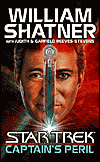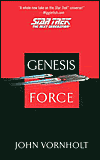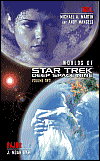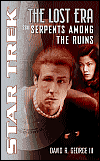New Frontier: After the Fall, by Peter David
Book Review by C. Dennis Moore
Have you read this book?
It's very important, when you're writing an ongoing series, to make sure things reflect the true nature of real life, which is change. If the characters don't grow, they're just that: characters. We want people. And let's face it, change has always been one of the staples of the Star Trek universe. Part of the fun of every new movie was always trying to gauge by those first few scenes what had changed about the characters, for instance Kirk's been promoted to Admiral, Sulu is captain of the Excelsior, Riker and Troi are getting married. Peter David understands very well the importance of change in the Trek universe; Book Fifteen of his New Frontier series, After the Fall, picks up a full three years after the previous novel, "Stone and Anvil"L.
In that time, Soleta has left Starfleet, Captain Shelby is now Admiral Shelby, in charge of Space Station Bravo instead of the USS Trident. And Ambassador Si Cwan has finally established the New Thallonian Protectorate.
Unlike the previous two NF novels (the only other two I've read), After the Fall doesn't focus so much on the USS Excalibur and her captain Mackenzie Calhoun. In fact, it's not until page 129 that we even set foot on the Excalibur. But the NF novels are not only about that ship and that captain. This is a world David is building, and as such every character has their part to play.
It's just days before Kalinda, sister to Si Cwan, is about to be married off to her lover Tiraud, son of the co-head of the New Thallonian Protectorate, Fhermus. There's obvious history between Si Cwan and Fhermus, but for the sake of their loved ones, they're looking on this marriage as an opportunity to strengthen the Protectorate.
But Xyon has other plans. Xyon is Calhoun's son, who for years has been believed dead. Soleta knows otherwise, however, and when she mentions to him that Kalinda (with whom Xyon is in love) is about to be married, Xyon races to New Thallon to stop the wedding. When Kalinda tells him no chance, that she's moved on--berating him for making everyone believe he was dead while at the same time trying to deal with her own emotions over realizing he's not--Xyon does the only thing he can. He kidnaps her.
Xyon is so sure that, once away from the influence of her new life, she'll realize she still loves him and everything will be peaches and cream. But Kalinda's not a pushover, and she's not some puppet Xyon can manipulate at will. Soon Xyon comes to realize his mistake and he turns around to return Kalinda to New Thallon. Only they're confronted with an immense, alien ship unlike anything in the records of Starfleet. The strangers take Kalinda from Xyon, knock him out, and erase any notion of their existence from his ship's computers. When Xyon is found by the Protectorate, his story that Kalinda was abducted from his ship is dismissed, especially since the computer doesn't agree with Xyon's memory, and he's about two seconds away from having his a$$ handed to him. Unless someone, Calhoun perhaps, can convince the Protectorate Xyon is telling the truth. Not only that, but--and more importantly--find Kalinda and return her to New Thallon.
Another great Trek book from Peter David. I'm really digging this New Frontier series and I really like the characters. Of the three I've read, After the Fall is probably my favorite.
I think David reigned himself in a bit with this one. Instead of the over-written, laugh-a-minute style of "Stone and Anvil" where every other line of dialogue was a sarcastic remark or a sitcom one-liner, After the Fall deals with the truth of the characters, their emotions, their relationships to each other, and with their real inner lives, not just the stuff we need to see to advance the plot. That's not to say he doesn't throw in his jokes. I mean, this is Peter David, so no matter how serious the story, I think there are times when he can't help but be funny:
"Actually," Calhoun said slowly, his gaze not leaving Si Cwan, "I need you to investigate this for me. We're somewhat tied up on another matter."
"Another matter? Let me guess: It has something to do with that a$$ Si Cwan, and his assemblage of howler monkeys."
There were stunned gasps mixed with laughter from nearby and Si Cwan's face became slightly redder than it typically was. "Captain Mueller," Si Cwan called out, "you should know that Captain Calhoun is standing not ten feet away from both myself and the assemblage."
There was a pause. "Oh. You heard that?"
"Every word."
"Good," Mueller's voice came back. "I was hoping you were within earshot, you ass."
Si Cwan looked with some chagrin at the dumbfounded onlookers. "We . . . had a relationship once," he said by way of explanation.
I love that part. Then, of course, where would we be if I didn't find the negative? This book has great characters, lots of action, and an awesome plot. But the thing that really gets to me sometimes, especially if I'm enjoying the book, is when you find those passages you know didn't get a final edit before the book went to press. Whether because of deadlines or a sloppy eye, who knows, but when a passage like this gets out, something inside me cringes a little bit:
"Transporter room, aye," came a brisk female voice.
"Lock on to the signal we're currently receiving and bring the individual on the other end aboard. I'll be right down. Arex, with me," Mueller said briskly. "Hash, take over watch on the sinkhole. Desma, you have the conn."
Did you catch it? Yes, it was the double use of "brisk" in only three sentences. Not that there's anything fundamentally wrong with that, but let's face it, brisk isn't a word you use a lot. So using it twice in such close proximity draws attention to it, and when individual words like that stand out, words that aren't dropping hints about the progression of the plot or who killed whom with what in which room, it's not good. It doesn't necessarily draw the reader out of the story, but it jars the mind just enough to interrupt the flow for a brief second. My Microsoft thesaurus found 7 alternatives, Peter David couldn't use one of them?
This may seem like nitpicking, but it happens quite often in After the Fall and I stand by it. The reader in me hits a speed bump, while the editor in me wants to circle it and the writer in me thinks "I wouldn't have done that, why aren't I writing Trek novels?" I just think the book would have been even better with one more pass to clean up some of the spills.
That being said, After the Fall is still my favorite so far. "Gods Above" was good, but I was just starting to learn the characters and that was one outlandish plot anyway. "Stone and Anvil" was great, too, but it jumped back and forth in time to tell the story and that can sometimes be a bit much to slog through. But After the Fall is a straight shot from beginning to end with not much time to rest along the way, and as much as I do love an interesting approach to telling the story, or sometimes an outlandish plot, there are also times when I just want to be entertained. And After the Fall manages that task very well indeed.
In that time, Soleta has left Starfleet, Captain Shelby is now Admiral Shelby, in charge of Space Station Bravo instead of the USS Trident. And Ambassador Si Cwan has finally established the New Thallonian Protectorate.
Unlike the previous two NF novels (the only other two I've read), After the Fall doesn't focus so much on the USS Excalibur and her captain Mackenzie Calhoun. In fact, it's not until page 129 that we even set foot on the Excalibur. But the NF novels are not only about that ship and that captain. This is a world David is building, and as such every character has their part to play.
It's just days before Kalinda, sister to Si Cwan, is about to be married off to her lover Tiraud, son of the co-head of the New Thallonian Protectorate, Fhermus. There's obvious history between Si Cwan and Fhermus, but for the sake of their loved ones, they're looking on this marriage as an opportunity to strengthen the Protectorate.
But Xyon has other plans. Xyon is Calhoun's son, who for years has been believed dead. Soleta knows otherwise, however, and when she mentions to him that Kalinda (with whom Xyon is in love) is about to be married, Xyon races to New Thallon to stop the wedding. When Kalinda tells him no chance, that she's moved on--berating him for making everyone believe he was dead while at the same time trying to deal with her own emotions over realizing he's not--Xyon does the only thing he can. He kidnaps her.
Xyon is so sure that, once away from the influence of her new life, she'll realize she still loves him and everything will be peaches and cream. But Kalinda's not a pushover, and she's not some puppet Xyon can manipulate at will. Soon Xyon comes to realize his mistake and he turns around to return Kalinda to New Thallon. Only they're confronted with an immense, alien ship unlike anything in the records of Starfleet. The strangers take Kalinda from Xyon, knock him out, and erase any notion of their existence from his ship's computers. When Xyon is found by the Protectorate, his story that Kalinda was abducted from his ship is dismissed, especially since the computer doesn't agree with Xyon's memory, and he's about two seconds away from having his a$$ handed to him. Unless someone, Calhoun perhaps, can convince the Protectorate Xyon is telling the truth. Not only that, but--and more importantly--find Kalinda and return her to New Thallon.
Another great Trek book from Peter David. I'm really digging this New Frontier series and I really like the characters. Of the three I've read, After the Fall is probably my favorite.
I think David reigned himself in a bit with this one. Instead of the over-written, laugh-a-minute style of "Stone and Anvil" where every other line of dialogue was a sarcastic remark or a sitcom one-liner, After the Fall deals with the truth of the characters, their emotions, their relationships to each other, and with their real inner lives, not just the stuff we need to see to advance the plot. That's not to say he doesn't throw in his jokes. I mean, this is Peter David, so no matter how serious the story, I think there are times when he can't help but be funny:
"Actually," Calhoun said slowly, his gaze not leaving Si Cwan, "I need you to investigate this for me. We're somewhat tied up on another matter."
"Another matter? Let me guess: It has something to do with that a$$ Si Cwan, and his assemblage of howler monkeys."
There were stunned gasps mixed with laughter from nearby and Si Cwan's face became slightly redder than it typically was. "Captain Mueller," Si Cwan called out, "you should know that Captain Calhoun is standing not ten feet away from both myself and the assemblage."
There was a pause. "Oh. You heard that?"
"Every word."
"Good," Mueller's voice came back. "I was hoping you were within earshot, you ass."
Si Cwan looked with some chagrin at the dumbfounded onlookers. "We . . . had a relationship once," he said by way of explanation.
I love that part. Then, of course, where would we be if I didn't find the negative? This book has great characters, lots of action, and an awesome plot. But the thing that really gets to me sometimes, especially if I'm enjoying the book, is when you find those passages you know didn't get a final edit before the book went to press. Whether because of deadlines or a sloppy eye, who knows, but when a passage like this gets out, something inside me cringes a little bit:
"Transporter room, aye," came a brisk female voice.
"Lock on to the signal we're currently receiving and bring the individual on the other end aboard. I'll be right down. Arex, with me," Mueller said briskly. "Hash, take over watch on the sinkhole. Desma, you have the conn."
Did you catch it? Yes, it was the double use of "brisk" in only three sentences. Not that there's anything fundamentally wrong with that, but let's face it, brisk isn't a word you use a lot. So using it twice in such close proximity draws attention to it, and when individual words like that stand out, words that aren't dropping hints about the progression of the plot or who killed whom with what in which room, it's not good. It doesn't necessarily draw the reader out of the story, but it jars the mind just enough to interrupt the flow for a brief second. My Microsoft thesaurus found 7 alternatives, Peter David couldn't use one of them?
This may seem like nitpicking, but it happens quite often in After the Fall and I stand by it. The reader in me hits a speed bump, while the editor in me wants to circle it and the writer in me thinks "I wouldn't have done that, why aren't I writing Trek novels?" I just think the book would have been even better with one more pass to clean up some of the spills.
That being said, After the Fall is still my favorite so far. "Gods Above" was good, but I was just starting to learn the characters and that was one outlandish plot anyway. "Stone and Anvil" was great, too, but it jumped back and forth in time to tell the story and that can sometimes be a bit much to slog through. But After the Fall is a straight shot from beginning to end with not much time to rest along the way, and as much as I do love an interesting approach to telling the story, or sometimes an outlandish plot, there are also times when I just want to be entertained. And After the Fall manages that task very well indeed.
|
Click here to buy New Frontier: After the Fall, by Peter David on Amazon
|
New Frontier: After the Fall, by Peter David on Amazon
| More Books You Might Like |
Comment on New Frontier: After the Fall, by Peter David
| Comments on New Frontier: After the Fall, by Peter David |
| There are no comments on this book. |




